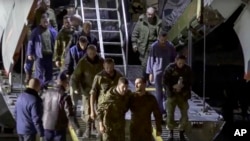A team of U.N. investigators finds both Ukrainian and Russian prisoners of war have been subjected to torture and ill-treatment by their captors. The report is based on interviews over the past several months with 159 POWs, including 20 women held by the Russian Federation and 175 male POWs held by Ukraine.
The investigators report only Ukraine has granted them confidential access to Russian prisoners of war in places of internment. They say Russia did not grant them similar access, so they have conducted interviews with Ukrainian POWs upon their release.
Speaking from Kyiv, the head of the U.N. Human Rights Monitoring Mission in Ukraine, Matilda Bogner, said Ukrainian prisoners of war told her team they were beaten immediately upon capture. Some had their personal belongings pillaged.
When they arrived at certain Russian internment centers, Bogner noted the POWs said they were subjected to prolonged beatings, threats, dog attacks, were stripped and put into stress positions.
Bogner said the mission has received information that nine POWs have died during these so-called admission procedures since mid-April. She said her team is working now to corroborate these reported deaths.
“The vast majority of those we interviewed told us that during their internment they were tortured and ill-treated,” she said. “Torture and ill-treatment were not only used to coerce prisoners of war to give military information or statements about alleged crimes. They were, interviewees told us, used on a daily basis to intimidate and humiliate them.”
Bogner said the U.N. mission has documented cases of Russian POWs subjected to torture and ill-treatment by members of the Ukrainian armed forces. According to Bogner, some of the men said they were punched and kicked after surrendering and when interrogated. Others said they were stabbed or given electric shocks by Ukrainian law enforcement officers or military personnel guarding them.
“There have been allegations, credible allegations of summary executions carried out by Ukrainian armed forces,” she said. “These happened earlier on in the conflict. The authorities, Ukrainian authorities have opened investigations into those allegations. But we have not seen progress in the investigations thus far.”
Bogner said she and her team have not yet been to the southern port city of Kherson, which Ukraine recently recaptured from Russia. She noted U.N. monitors have conducted investigations in several nearby villages which were abandoned by the Russian forces in the past few weeks.
She said they have “documented over 70 - almost 80 - cases of enforced disappearances and arbitrary detentions” in the area.
Bogner said the mission will investigate alleged war crimes, and violations of human rights and international humanitarian law that may have been committed by Russian forces in Kherson.




